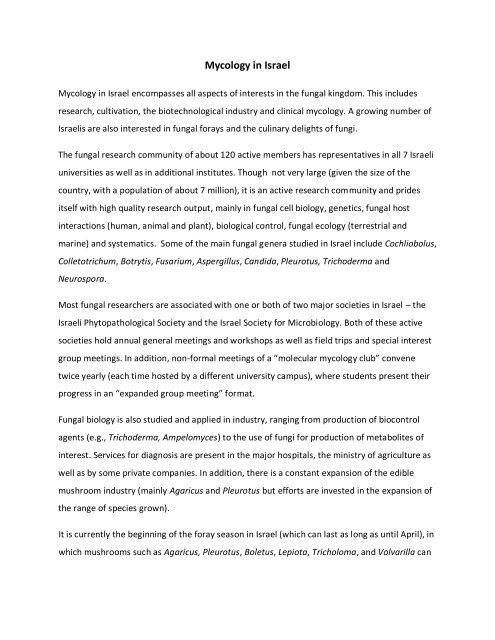NAMC – Newsletter of the Asian Mycological Committee
NAMC – Newsletter of the Asian Mycological Committee
NAMC – Newsletter of the Asian Mycological Committee
You also want an ePaper? Increase the reach of your titles
YUMPU automatically turns print PDFs into web optimized ePapers that Google loves.
Mycology in Israel<br />
Mycology in Israel encompasses all aspects <strong>of</strong> interests in <strong>the</strong> fungal kingdom. This includes<br />
research, cultivation, <strong>the</strong> biotechnological industry and clinical mycology. A growing number <strong>of</strong><br />
Israelis are also interested in fungal forays and <strong>the</strong> culinary delights <strong>of</strong> fungi.<br />
The fungal research community <strong>of</strong> about 120 active members has representatives in all 7 Israeli<br />
universities as well as in additional institutes. Though not very large (given <strong>the</strong> size <strong>of</strong> <strong>the</strong><br />
country, with a population <strong>of</strong> about 7 million), it is an active research community and prides<br />
itself with high quality research output, mainly in fungal cell biology, genetics, fungal host<br />
interactions (human, animal and plant), biological control, fungal ecology (terrestrial and<br />
marine) and systematics. Some <strong>of</strong> <strong>the</strong> main fungal genera studied in Israel include Cochliobolus,<br />
Colletotrichum, Botrytis, Fusarium, Aspergillus, Candida, Pleurotus, Trichoderma and<br />
Neurospora.<br />
Most fungal researchers are associated with one or both <strong>of</strong> two major societies in Israel <strong>–</strong> <strong>the</strong><br />
Israeli Phytopathological Society and <strong>the</strong> Israel Society for Microbiology. Both <strong>of</strong> <strong>the</strong>se active<br />
societies hold annual general meetings and workshops as well as field trips and special interest<br />
group meetings. In addition, non-formal meetings <strong>of</strong> a “molecular mycology club” convene<br />
twice yearly (each time hosted by a different university campus), where students present <strong>the</strong>ir<br />
progress in an “expanded group meeting” format.<br />
Fungal biology is also studied and applied in industry, ranging from production <strong>of</strong> biocontrol<br />
agents (e.g., Trichoderma, Ampelomyces) to <strong>the</strong> use <strong>of</strong> fungi for production <strong>of</strong> metabolites <strong>of</strong><br />
interest. Services for diagnosis are present in <strong>the</strong> major hospitals, <strong>the</strong> ministry <strong>of</strong> agriculture as<br />
well as by some private companies. In addition, <strong>the</strong>re is a constant expansion <strong>of</strong> <strong>the</strong> edible<br />
mushroom industry (mainly Agaricus and Pleurotus but efforts are invested in <strong>the</strong> expansion <strong>of</strong><br />
<strong>the</strong> range <strong>of</strong> species grown).<br />
It is currently <strong>the</strong> beginning <strong>of</strong> <strong>the</strong> foray season in Israel (which can last as long as until April), in<br />
which mushrooms such as Agaricus, Pleurotus, Boletus, Lepiota, Tricholoma, and Volvarilla can


